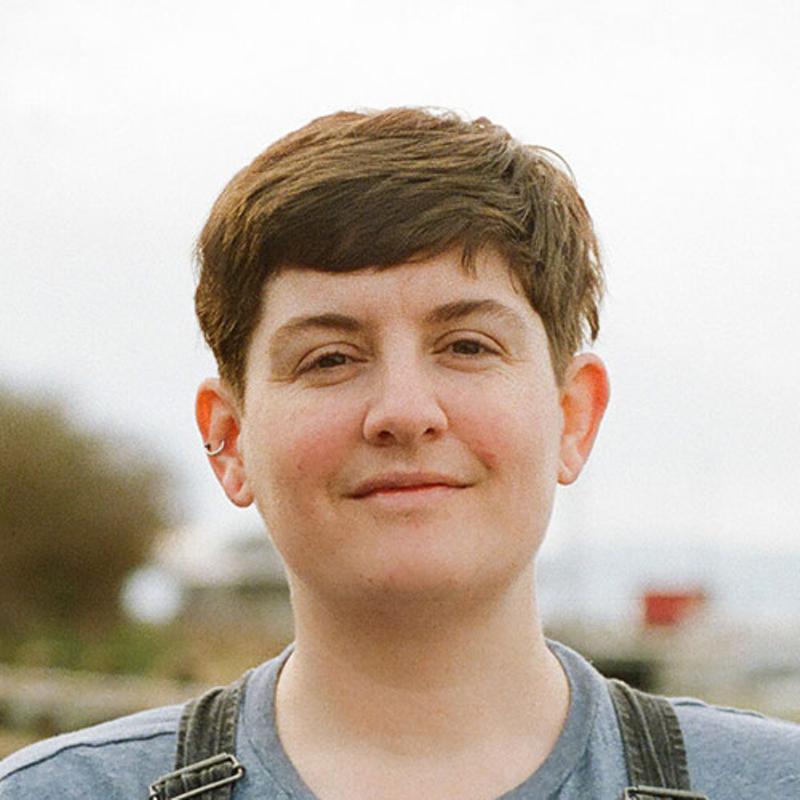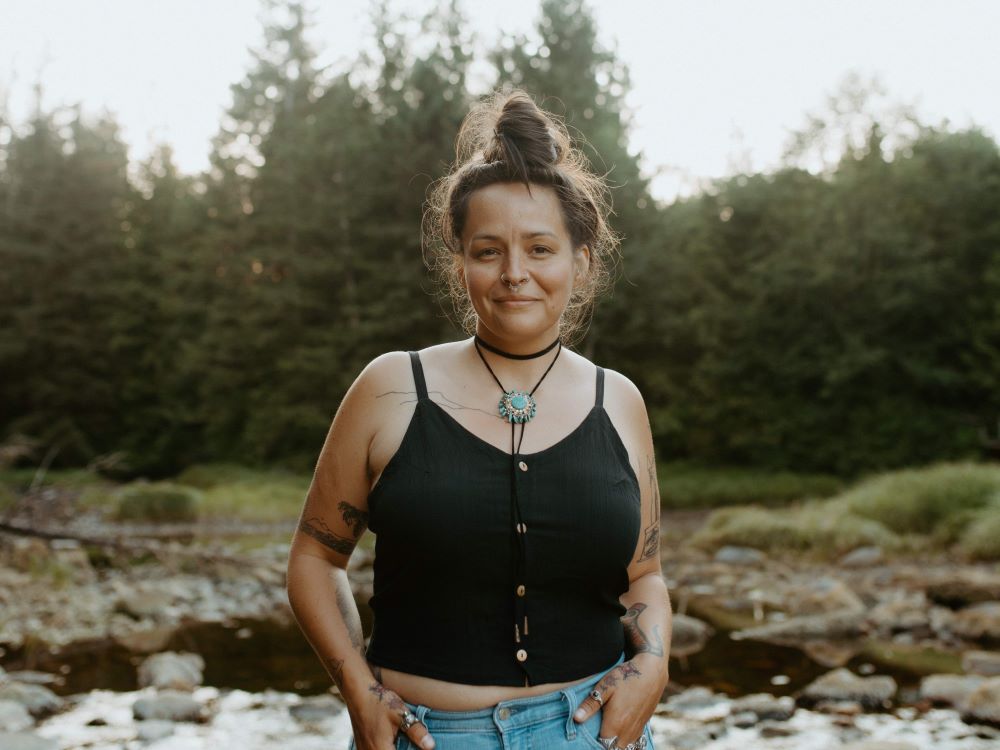Tyee contributor Jess Housty’s highly anticipated first book, Crushed Wild Mint, is a beautiful, meditative collection of poetry that is deeply rooted in their Heiltsuk homeland, a coastal region of B.C. that includes Bella Bella.
A B.C. bestseller, Crushed Wild Mint offers space for reflection and growth amidst imperfection, and encourages readers to mull over interconnectedness — as in this excerpt from the poem “ƛ̓ásákv”:
We are islands that are joined beneath the sea and in the absence of a sea we are a continent.
The Tyee caught up with Housty (’Cúagilákv) to talk about poetry, being in relationship with the land, grief, community organizing and plum jam. This interview has been edited for length and clarity.
The Tyee: Your poetry so embodies your homeland and I’m wondering if this is also woven into the way you conceive of your poetic practice. You work closely with the land as an herbalist and gardener; do you think of poetry also as a way of working with the land?
Jess Housty: Absolutely. I’m not sure I even think of it as a separate practice. I mean, I was so blessed to be raised in my homeland and spent a lot of time out on the land with my family, and to really grow up and come of age out in the wild spaces in my territory. And so for me, the lands always felt inseparable from my identity.
The gifts that it gives me create a responsibility in me to care for the land and be in relationship with the land. Everything that I do, whether it’s writing and storytelling or community work or working with plants and growing food, all of that really feels like it’s part of the same whole. For me, they’re just different expressions of the same deep relationship that underpins everything about who I am.
Does that impact the way you think about sharing your work in your home community versus with people outside of your home community?
You know, I actually had really deep anxiety for a long time that the things that I wrote wouldn’t make sense or be interesting to people who don’t live in this place. When I was writing for this collection, what I was trying to hold myself to was accountability to this land in this place. And I wasn’t sure if that would translate for folks. So it’s actually been really beautiful and interesting to hear how it resonates for people who are from very different spaces and very different landscapes and very different relationships to place.
In the poem “Sixty-Eight Plums,” 68 plums appear on a doorstep, and are turned into jam to leave on other people’s doorsteps. This poem encapsulates such a different understanding of what the capitalistic paradigm asks us to understand as abundance. That true abundance comes through community — to turn a gift into more gifts. It made me wonder if you were writing to capture a moment for yourself, or writing as a way to enact an example of abundance, which is a word and a theme that arises often in your work?
In a lot of coastal Indigenous cultures, your wealth is measured not by what you’ve accumulated but by what you give away to other people. I feel like the example that most people know of is something big like a Potlatch, where a chief and their family are hosting this big event and giving a multitude of things away to the community that has come together. And that’s beautiful. But living in community and living in culture the way I’m so blessed to do, I get to see small expressions of it all the time.
And so for me, that was just a really beautiful moment of this unexpected gift being left with me. I never learned who left the plums on my doorstep. I still have no idea where they came from. And I’m not sure everyone who found a jar of jam at their doorstep knew that it came for me.
For me, it was just one of those really small, microcosm moments of that idea of a Potlatch economy and an abundance mindset that’s so present in the way I get to live in community.
In the poem “12.15.21,” you write, after bell hooks, that becoming an ancestor “must be an act of perpetual love.” I’m wondering if you could talk a bit more about that?
It’s coming up on two years since my grandmother passed away. I’ve had relationships with so many incredible people in my life who have sadly passed away. I felt like I had a moment where I either had to choose — being in the grief and loss and risking getting stuck in it, and it’s so important to sit with grief, but at a certain point — you also have to have movement, or reframing about the way you think about that loss.
It happened in small ways with different people and in bigger ways with my grandmother, that I realized that their physical form in this world with me was such a temporary thing, but what they become when they become an ancestor is so permanent and deep and beautiful and immovable.
It’s something that’s always brought me a lot of comfort in times of loss.
Your poem “Mirror-Touch Synesthesia” was a bit of a personal jolt for me — I didn’t realize that not everyone experienced the world by feeling sensations that are happening to other humans or animals. Your poem specifically enacts the experience of feeling mirror-touch synesthesia as someone cleans an animal after it has been harvested, and I’m wondering if this way of experiencing the world has informed your understanding of harvesting and processing and participating in cycles of life?
There were points in my life where I struggled with how casual some people seemed to be able to be in their relationships with nature and place and animals and plants, because I thought that they were experiencing things in that really deep, jolting physical way [as with mirror-touch synesthesia]. For me, that’s sort of just one small example of realizing my own neurodivergence, which has been a really interesting path for me over the last few years — of understanding that my way of being in the world, in lots of ways, is really different from the “normal.” I hate that word.
There’s a real intensity to the sense of connection and empathy that I feel for what is around me that absolutely informs how I show up in my relationships, how I show up in my practices out on the land. Even for folks that don’t naturally experience that in a really deep, innate, unexpected way, it’s still something that they can choose to become more aware of. So that’s something I encourage when I’m out on the land with kids and community, to try to practice really deep empathy for what’s around us and be in deep kinship with the world around us.
In the poem “Spring,” you write:
Take one deep breath for your ancestors, one for yourself, and one for the world yet to come.It is permissible to come to this work hesitant, tired, wounded.
What kind of work were you thinking of when you were writing this poem? Could you talk a bit about what happens when you make space to come to that work hesitant and tired? What comes next?
In my life, I’ve had the immense privilege of doing all different kinds of community work. That’s the work that I love to do. And it’s not easy work. And when I think about especially around the campaign-oriented work I’ve done over the years, around trophy hunting or pipelines, I have often felt this really deep sense of imposter syndrome. That I’m not perfectly healed, therefore I’m not the person who can step into a leadership role to do this work. And I also hear that very often from people who are being asked or encouraged to step into leadership roles in community: I want to do that, but I’m not the right person. I’m not ready. I’m not whole, I’m not healed.
The more I’ve been engaged in this kind of practice in the world, the more I’ve realized that the people who’ve mentored me, the people who’ve held me in his work, are not perfect and are not healed either. But they find really beautiful ways to bring others in and to heal together. And that shows up in big ways with like the sort of flashy overwhelming campaign work, and it also shows up in really small ways and in really small moments every morning, when I wake up and ask myself: can I wake up and can I walk to work or walk out into the community and go and do the things I need to do?
There’s often this hesitation of: I’m not perfect, therefore, I shouldn’t. And so it’s sort of become this chant to myself that I don’t have to be perfect to do good.
And often the healing that I recognize I need happens through showing up imperfectly and doing the work anyway.
There’s a push and pull in many of the poems in Crushed Wild Mint — a sense that a person is a small part of a bigger whole, but also that a person, in themselves, contains the whole big wide world. Is that a push and pull you experience? Or is it something you experience as a push and pull?
I think that they are two grooves that exist side by side for me. And I think that is the case because my sense of my own identity is so intertwined with the place that I come from that I don’t make sense in a deep way outside of this place. I can show up in the world in different places and interact with people and they can know parts of me. But to know the whole of me, I feel like you need this whole landscape that is around me as a translation guide.
So it is absolutely true that I feel like I’m one small part of this big, beautiful territory. And also that this big, beautiful territory is underpinning everything about who I am. ![]()
Read more: Indigenous, Books, Environment

















Tyee Commenting Guidelines
Comments that violate guidelines risk being deleted, and violations may result in a temporary or permanent user ban. Maintain the spirit of good conversation to stay in the discussion and be patient with moderators. Comments are reviewed regularly but not in real time.
Do:
Do not: